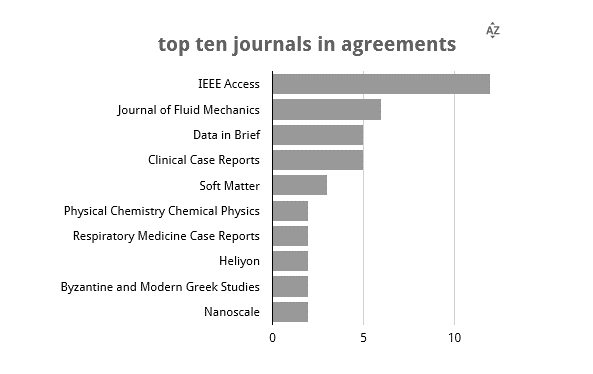
On behalf of the SEAB Scientific Communication Unit, we would like to inform you that the statistical progress report of the SEAB Open Access Programs for the first half of 2021 has been published. The report includes the publications supported by the exemption or discount agreements, as well as the SEAB participatory program in the Open Library for Humanities. The indicators have been produced always taking into account that the corresponding author belongs to a member institution of SEAB. We remind you that the data is received from the collaborating publishers and then checked, normalized and enriched by the staff of the Scientific Communication Unit.
In absolute numbers, there is an increase in the number of publications supported by the Association compared to the number in the corresponding period of the previous year. Specifically, in the first half of 2021, 119 publications were covered, which corresponds to a more than double increase (~ 158%) from the 46 publications in June 2020. It should be noted, however, that last year data were extracted and certified retrospectively, support programs started operating fully in October 2020.
Nevertheless, a positive development is the increase observed in the publications covered by full exemption agreements. The Royal Society of Chemistry has reached 38% of the target (23 out of 63 publications), up from 14 in the same period last year, while the Cambridge University Press has reached 35% of the target, ie 24 out of 70 publications instead of just six in June . The increase in the publications that benefited from the discount provided by the Association’s agreements was more than doubled with 68 publications compared to 23 in the corresponding half of last year.
There is only one publication in the Open Library for Humanities affiliate program, which shows that there is room for further use of the program. Although the report does not include data for the SCOAP3 participatory program, the data of which will be included in the annual report of 2021, nevertheless the first indications show increasing trends in this area as well.
The improvement of these indicators could be attributed to the interest of Greek researchers in the Open Access publications and the options offered by SEAB. The growing number of Institutions that participated in the programs (27 versus 19 last year in the same period) effectively contributed to this growing interest, effectively contributing to the network of librarians in Greek universities who disseminated the programs to the respective communities, but also to the support mechanisms of the Scientific Unit. Communication that in the first half served 235 requests via e-mail.
